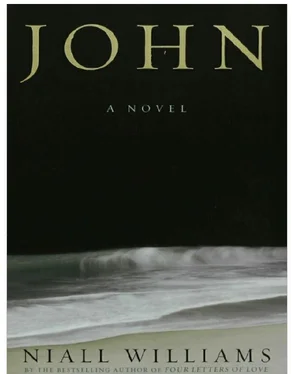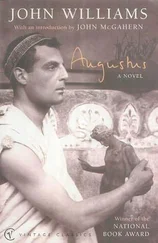He wades forwards and scans sideways into the sea, his vision smeared, and grief delirium not far. Gulls raucous wheel and hang overhead. Long, ragged ribbons of weed are in the tide and twine about him. He presses further into the freezing waves, peering down at what touches against him, half expectant to see floating and dragged there the drowned apostle.
Papias sees what may be the white head. It is some way out, in the high, rolling waters. If it is a man, he is to the point of his depth and faces the waves that come higher than him, making his head vanish in the foam.
Now, Lord.
Now.
I am here to meet you.
By water. As in the beginning.
Come now.
'Master! Master!' Papias calls. His voice is carried away, but in the expiration of another wave he sees clearly now that it is the Apostle deep in the sea. Papias calls to him again and wades forward. The water is ice against his chest, his breath is crushed. But he pushes on; John is thin and weak and will drown in moments. What madness is this? Why has he blindly gone into the sea? Is his mind overthrown? He must be saved. Unevenly the sand floor falls away, and suddenly Papias is deeper and loses footing and drops beneath a wave, wide-mouthed and gulping. He cannot swim; he paws wildly at the sand glitter and a long, slimed scarf of weed that enwraps his neck. His life bubbles furiously; kicking and flailing he sinks to drown.
In blind underwater his eyes are bulged O's of astonishment that it will end so. He calls out another grey bubble, is by a wave rolled upon himself so his garment swirls as a sea flower, and his white legs are strange stamens, loose and long and darted through by silvered fish in that fish-full sea.
Kicking done, a sandal falls free, spins, floats, sinks, heels into the home of sea lice and sea worms.
Papias is taken out by the hungry tide; the one who came to save, drowned. His eyes are open, white and pinked as scallops, his fingers pale starfish, all his body a bountiful island of feed. Underwater, the motion of the waves is soothing, is as waves of sleep coming, one after the other, each taking him further. He lets go, lets go of rescue, of struggle, of overcoming the sea. In the same instant, as if his life departs from him like a ship and he watches it go, Papias feels float from him the service of the Apostle. Floating from him are the years he has followed the Master since he heard the Christians were banished on Patmos and came himself in a fisher's boat to be baptised and stay. From him go the years of prayer and attendance and faithfulness, dissolving goes the night he has spent, the woman Marina, her dead children just ahead of him now on the journey into the everlasting. All sails into the deeps. Papias lets go, is dragged down by the undertow, wave-spun, his chest crushed for last air. A briny nothingness takes him. His brain is dulled, a sea cabbage, his final expression empty surrender.
The undersea sounds constant pounding. As though all is within a great ear, pulse and thrum, susurrus, the ceaseless sighing. Fish, silent as death, slip one direction for another. On the sea floor a shell moves minutely. Black weed waves funereal slow. The body of the man sinks unevenly, feet down, head up, as if to foot off water sprites or land walking in the afterlife. It is as ascension in reverse, slow, deliberate, hands outwards, hair fanned, garments waving even with heavenly majesty, but in descent. This floating sinking is for ever, a journey not many feet but enduring out of time, the sea's small mercy before the body touches bottom and does not rise.
But then it does.
It defies the laws of death and dominion of the sea.
It surges upwards, past waterweed and fish shoal and bursts headfirst through the waves.
Papias does not feel the hands that grasp him. His eyes are away, his mouth agape. He does not know how the drowned return, how life is measured, cut, or granted, how in the vastness of the sea the blind apostle has found him. Has he pulled back the tide like a cloth? Has he seerP. Papias has no mind to ask. Lifeless, he does not feel the fierce strength in the old man, but is fallen against the Apostle's breast, is cradled there, where the sea seems to withdraw from them. What daylight shines, what air enwraps them, are all unknown to the drowned servant; what prayers may be said, what words called up to the very gates of heavens, unheard by him.
He is held in the arms of the Apostle.
Then brusque life returns. Violent air like fierce light is thrust into the flooded chambers, and Papias is convulsed. He gags and his head shudders. John holds him. The sea about their waists. With brief flickering the eyes of the drowned open. Papias sees where he is.
He opens his mouth and speaks a spew of seawater.
'Praise God,' the blind apostle says.
And Papias turns to the grey swirl of sky all about them, as if he might see just then, the sight of the Lord himself departing.
'His mind is lost,' Matthias says. 'In his blindness he does not know day from night. He wandered out and did not know where he was and could have perished in the sea. This is the truth. Prochorus, tell me, is this not the truth?'
They sit inside the open doorway of Matthias's dwelling of skin and sticks, planking and rock. Iron light falls, the sea beyond rough.
Matthias offers a dried fig, gnaws on its aged wrinkling when it is declined.
'You have known him, Prochorus. He is no longer the same man. You cannot say so. And yet we follow what he says. Answer me this: if he says we must all walk into the tide and drown in the morning, what shall we answer?' Matthias's hooded eyes seek the scribe's, but Prochorus looks away.
'I tell you this. We do nothing here for the Lord. This is not what God wants of us, Prochorus. He spoke to the Ancient many years ago, but does he now? The others will not ask this question, but they think it. I know they do. You do, too, don't you? You must wonder where is the one singed with fire that dictated the revelation? Where are the revelations he promised were at hand?'
The fig requires harsh chewing to find flavour. Matthias works it, pursed in his cheek, fingers out seed caught in his teeth. His voice is clear and unafraid; he has calculated what he is to say and has chosen now, and Prochorus, with whom to begin.
'Consider,' he says, and draws another fig from the pouch, offers it, is declined, eats. 'Consider this: Jesus of Nazareth was a man. He was the son of Joseph the carpenter. A Galilean. As a child he was a child. He did not cure the sick, raise the dead. He was as you or I, Prochorus. There were no signs. Nothing. Why so, if he was the Son of God? Why, if the Son of God, and his cousin is dying of a snakebite, his aunt lame, why not lay a hand and heal? Why not begin God's work at once? Illness and hurt were always present, why wait? Why play with other children and live an ordinary life if Jesus was the Son of God?'
Prochorus is uncomfortable on the timber stool. He feels flushed. The sweet smell of the fig on Matthias's breath is turning his stomach. His face is parched and stiff from the salt wind.
'Answer me, Prochorus. Why?'
'I need water. I am thirsty.'
'There is only one answer,' Matthias continues, the water in a pouch behind him. 'The Son of God would not play with children, would not learn the trade of carpentry. For what? For what purpose learn to plane wood? No, these are human things, Prochorus. Listen to me. Listen.' Matthias's lips are thin, his face a thin triangle climbed with black beard. 'The truth is, Jesus was as you or I.'
'Jesus was the Christ.'
'But first he was a man, then God descended upon him. Just as he had on the Baptist before him, and before him on David, and on Moses, and Elijah, and so on into ancient time. The Lord descended upon him and he became the Christ and was no longer the carpenter. God came upon him so that Jesus might do his work. It is the truth; I know it, Prochorus. And answer me this, why would the Son of God allow himself to be scourged like a man, to be spat upon, humiliated, and hung to his death on the cross?'
Читать дальше










